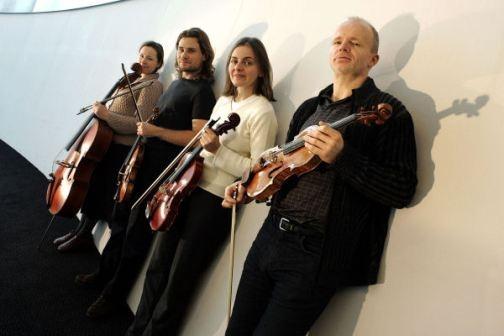This is the second Sunday in a month that I've sat in the Wigmore Hall and been plunged into an evening of ferocious concentration from the very first bars. Mid-January saw violinist Leonidas Kavakos and his phenomenal pianist Enrico Pace carving out the grim memorial that is Prokofiev's First Violin Sonata, ultimately softened by radiant Schubert. Last night Kavakos's peer Thomas Zehetmair accented the lead in late Beethoven, and since only Shostakovich's last quartet followed, this time there was to be no more human gilding of a very alien lily.
It wasn't hard to see why the Zehetmair Quartet placed Beethoven's C sharp minor Quartet, Op 131, alongside Shostakovich's Fifteenth. Both run continuously, with seven and six movements respectively; both share "deep" minor keys and begin by unfolding their plaints string by string. Both, too, are in different ways valedictions forbidding mourning. Yet it was a hell of a challenge both for players and audience. And I wasn't sure the twinning would work after trying so hard to absorb the Beethoven, but with a usual sense of bafflement. It was fine for Igor Toronyi-Lalic not to be sure about Ferneyhough last week; but if I say I still don't get some of these late Beethoven quartets, I'm probably liable to be pelted with comments of the "then why is he writing about it?" variety.
Believe me, I've tried: I spent months with the Borodin Quartet in the days when they, too, set their complete Beethoven alongside their complete Shostakovich. I tried to get to know the unknowable through score study and note-writing. And still I end up wondering where I am in Op 131 - all those seraphic variations - until we get to the aerial-chatterbox Presto movement. Which I thought the Zehetmairs could have despatched with madder and sparklier zest. Their ever so slightly rough edges - these are not the perfectly finished phrases of the Borodins or the Jerusalem Quartet - suit the rest and reduced me to awed metaphor. I saw, I truly did, four archangels treading, in angelic conversation, a landscape of gaping stranded monsters and finally routing the grim, galloping reaper who rides up out of an abyss in the finale. Whatever your image, Beethoven's is music not of this earth, developing and interrupted with unexpected lines and textures, and right from the first fourth-note jabbing accent of each player, the Zehetmairs performed it in an austere atmosphere of objective focus.
Somehow I don't have any problems with Shostakovich Fifteen. It shouldn't work, truly - six sombre Adagios without respite, all of them focused on the death which also haunts their predecessors in very different ways, starting with a movement which Shostakovich told its first players should be delivered "so that flies drop dead in mid-air, and the audience starts leaving the hall from sheer boredom". And yet I never find it either boring or "awesomely depressed and depressing", as David Fanning reasonably proposed in his note, at least not until the final ghostly death rattles. There's a spiritual purity, a frequent enough warming of the dead, vibrato-less chants which the Zehetmairs carried out with their already established objectivity. Thomas himself soared with the biggest tone imaginable, sounding like the darkest of violas in his muted lower register - though that was a biting example that the real viola player, Ruth Killius, was more than able to match. Slightly more reserved tones came from cellist Ursula Smith, and pitches forgiveably wavered once or twice under pressure. Yet the end result was mind-clearing. So it was a buzzy rather than a chastened audience which left the hall, having observed the necessary perfect silence throughout.













Add comment